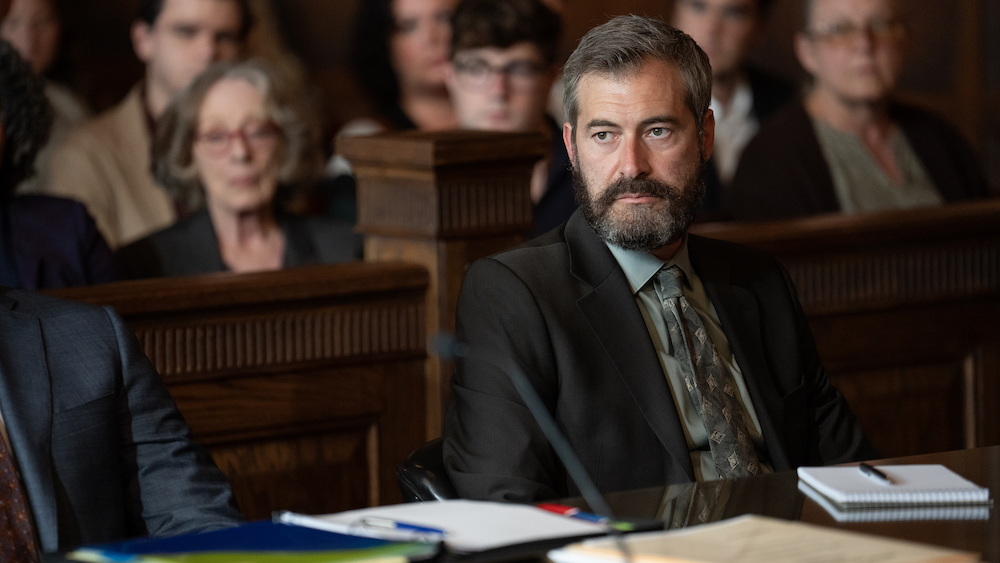SPOILER ALERT! This post contains details from the finale of Hulu‘s Good American Family.
Michael Barnett (Mark Duplass) may have been acquitted of child abuse charges in the finale of Hulu’s Good American Family, but he’s still faced with a reckoning, of sorts, about the role he played in Natalia Grace’s (Imogen Faith Reed) horrific childhood.
Unlike his wife Kristine (Ellen Pompeo), Michael takes a much more passive role in her mistreatment. It’s not his idea to abandon her in an Indiana apartment and move to Canada. He rarely even raises his voice at her, let alone impose the verbal lashings on her that Kristine does. And yet, he does nothing to stop any of it from happening to the eight-year-old.
“I think the monstrosity of some of what the character of Michael does in this show is in the subtlety, and is in particular in his passivity,” Duplass told Deadline. “So I think Michael is gripping whatever normalcy he has and putting blinders on, hoping, ‘Oh, well, this is just a bad phase with Natalia, and it’ll work out. Oh, Christine will get over it.’ That turns into the egregious enabling that that, I think, leads to, quite frankly, the emotional and spiritual destruction of a being like Natalia that did not deserve that.”
In the finale, after Michael’s trial, Natalia still tries to make him understand his culpability in her abuse. While there’s a glimmer of understanding, it’s clear he has a long way to go before he might ever truly contend with the destruction caused by his passivity.
Duplass unpacks that in the interview below and explains how he drew from his own experiences to approach Michael with empathy and understanding, rather than judgment, regardless of his supposed sins.
DEADLINE: Let’s start on a bit of a broader note. The TV landscape is very fractured right now. How do you decide which projects are right for you, and why was Good American Family one of them?
MARK DUPLASS: So let’s just be really honest for a second. It’s not like I’m getting all the offers in the world, and I’m like, ‘which of these 25 extremely well paid premium TV shows am I going to do?’ There are fewer things being made. So when something comes across my desk, I’m going to give it a ton of consideration. That’s for a number of reasons. Part of what I do in my career is the John Cassavetes model. I make a lot of money as an actor, and I use that to fund a lot of the independent television landscape that I work on. So that plays a big part in it, to be in shows like Good American Family, where, you never really know, but you have a sense it’s really going to work, because of the material, because of Ellen [Pompeo], all those things. That brings a lot to my career. Then, when you get into the weeds, for me, what was so compelling about this show in particular was our showrunners’ take on it. Katie [Robbins] and Sarah [Sutherland] came to me and were right away like, ‘We don’t want to do rip from the headline sh*t. We want to do something that actually counts and works,’ and they had this wonderful take about people’s biases and how they read headlines for these stories,and to sort of play into those biases by doing a multi-perspective take on a tale that we’ve already seen play out in the headlines and in a documentary series.
This idea that the first four episodes would play into that larger narrative of, ‘Oh my gosh, is this little person that this nice family adopted a monster that’s going to destroy them?’ And to take four episodes take people down that road before they flip it. I was like, ‘Well, that’s pretty daring to do on a big mainstream mini series.’ So I really appreciated that approach and the way that it implicates viewers and their biases going into things. Then the character of Michael got me really, really excited, because I think that, while he’s a real life figure, somewhat in the public eye, he’s not so like indelibly famous that I couldn’t take some liberties with how I wanted to do it. I really was interested in a couple of the things that I thought really make Michael tick, at least from this character’s perspective, like deep history with mental health issues. I’m really interested in men’s mental health and the fragility that that brings about, and the fear and Michael’s savior complex, because he sees Natalia as someone who has a lack of parental love and interest and care that he had. So he might overextend himself to try to save her and put blinders on — all those things are really fascinating to me.
DEADLINE: How did you approach the perspective shift when it came to Michael? I would say the changes in his character are much more subtle than Natalia’s or Kristine’s.
DUPLASS: I think the monstrosity of some of what the character of Michael does in this show is in the subtlety, and is in particular in his passivity. So you don’t see a lot of outright egregious active behaviors. What you see are, I would say, a gruesome enabling of horrific behavior around him, because he’s so fearful to confront Kristine, because he feels that she not only saved his life, he’s so scared that she might leave him because he has such a little opinion of himself. When you’re an anxious depressive — and this is something I can identify with — and your life is in a decent spot, you don’t want to make any changes, because you’re terrified that you’re going to spiral out into the dark place again. So I think Michael is gripping whatever normalcy he has and putting blinders on, hoping, ‘Oh, well, this is just a bad phase with Natalia, and it’ll work out. Oh, Christine will get over it.’ That turns into the egregious enabling that that, I think, leads to, quite frankly, the emotional and spiritual destruction of a being like Natalia that did not deserve that. So that was, I think, one of the most exciting things for me to play. When you look at what he’s doing in episodes one through four versus five through eight, they’re actually not that dissimilar in terms of a big performance shift.
DEADLINE: To that point, in that conversation between Natalia and Michael during the finale, what’s your take on how much he really has processed his culpability? Is he ever going to come to terms with what Natalia is saying to him, that he was an adult who allowed a child to be egregiously abused?
DUPLASS: In my opinion, it’s certainly not the ending where Natalia has dropped the knowledge on Michael, and the seas have parted, and he understands it, and he’s ready to apologize and make amends. No, I think it’s much sadder than that. I think you’re looking at the slightest pinhole opening of awareness that an adult in that position chose to save himself and whatever shred of normalcy and whatever shred of consistency he could hold on to and, in doing so, allowed the destruction of another being, particularly a very young being that he was in charge of. So I think he starts to maybe see what that is. But I think that a character like Michael is so depressed, so anxious, so desperate to stay on the rails, he can’t really look that in the face. But I do think the door cracks open just the tiniest bit for him, and he’s headed towards a dark road of reckoning and awareness of what he might have done to this person.
DEADLINE: In your interpretation of Michael, was there ever a time where he genuinely believes Kristine, or is it more like ‘I have to believe her otherwise my world falls apart’?
DUPLASS: I mean, what is the nature of willful denial, right? How conscious are we of that? In my own life, I have been surprised at my own ability to rationalize and justify certain decisions and put my awareness into a dark little box, because I was scared to look at it. My interpretation of Michael was that he really did believe that he was trying to do the right things and the good things. I think that in my portrayal of him, the emotional awareness is quite low, and so it’s pretty credible that he would be operating in that way. But at the same time, this goes on for so long. There are so many instances in which you would have to put the blinders on that it’s hard to believe that an adult would be that ignorant to it, and it takes quite a while for him to eventually oust Kristine from his life and get out from under her thumb. So I have no judgments about it. Honestly, I can completely see how that would happen, but it’s hard to believe that there wasn’t one moment where he didn’t know what he was doing.
DEADLINE: I appreciate the depth of your empathy for a character like this. How would you say that you developed that as an actor, not just with Michael, but more generally for complex characters like him?
DUPLASS: That’s nice of you to say, and I appreciate that. I think that my own personal journey with mental health has been a big component of me trying not to judge people and understand some quite questionable behavior. I was basically brought to my knees in my late 20s by ignoring my mental health, and I think I was a different person before that moment than I am now. I think if you talk to some people who knew me in high school, they’d be like, ‘I don’t know if Mark really is that sensitive and thoughtful and aware,’ because I don’t think I was. Then I hit the deck, and then something happens to you, and you don’t really go back from that. So I guess my long winded answer to that is I’ve seen some really dark and scary things in my own personal life. I understand how that can put you in a corner. I understand what fear of ending up alone can do to you and cloud your judgment. So for the lane of Michael, it was a fairly easy one for me to sort of illuminate that roadmap for him.
DEADLINE: We don’t really get closure in a traditional sense here, since these are real people who are still living their lives, and this story, in some ways, continues to play out. How did you reflect on where the show leaves the characters, and what are you hoping audiences might glean from that?
DUPLASS: It’s a really great question. I mean, the ideal viewing experience for me, for an audience, would be you’re watching this with some of your friends or your loved ones. Along the way, like so many people, you read some headlines, and when you watch the show and you see the horror angles that show Natalia, the scary music and the lighting and those little evil smiles that she gives, you become convinced, maybe a little bit too quickly, that she’s the villain. And that when Episode 5 comes around and you start to see the other perspective, you might consider some of the biases that might have that led you to that conclusion, and that by the end of this thing, you’re having dinner or dessert with the people you watched it with, and each of you is feeling fairly confident that you know what the truth is and who the bad people are, and then a raging argument might ensue, because you have difference of opinion. That would be perfect.
The post Mark Duplass On Whether Michael Barnett Comes To Terms With His “Egregious Enabling” Of Natalia Grace’s Abuse In ‘Good American Family’ Finale appeared first on Deadline.




